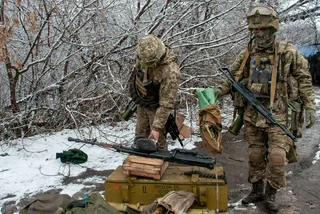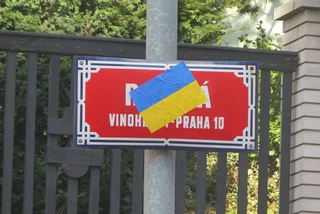16:23 Czechia has nuclear shelters for 250,000 people, says Fiala
Czech Prime Minister Petr Fiala announced that the Czech Republic has around 6,000 standard nuclear shelters capable of accommodating a total of around a quarter of a million people. If necessary, underground areas in buildings, the Prague metro or the Strahov tunnel could also serve as shelters. Fiala explained the Czech Republic's level of nuclear preparedness in respond to a question from a Freedom and Direct Democracy MP, with reference to Russian President Vladimir Putin's move to place the Russian nuclear arsenal on high alert over the war in Ukraine.
15:50 Prague's refugee assistance facility to move to Congress Center
Prague's refugee assistance center will move from the Municipal Library to the Congress Center building on Friday, Mayor Zdeněk Hřib announced today. The assistance center is being moved because its current location does not have sufficient capacity to meet demand. The new center will be able to meet the needs of 1,000 refugees a day. Officers at the center help refugees complete necessary documents, while providing basic information and assistance. The new refugee center will be non-stop, and will be situated close to a metro station. It's thought that Prague and the Central Bohemia region together host half of all the Ukrainians living in the Czech Republic.
15:42 Dramatic weakening of Czech crown predicted
The Czech crown could weaken to CZK 28 per euro as a result of the conflict in Ukraine, according to economic analysts. This dire scenario for the currency would come about in the event of an escalation of the conflict in Ukraine, or if Russia stops supplying raw materials to Europe. In this case, the Czech National Bank would have to intervene, the analysts argue. The crown has already suffered heavy losses on the euro, dollar and pound as a result of the Russian invasion.
15:27 Central Group stops selling properties to Russians
Czech developer Central Group has stopped offering and selling apartments to citizens of Russia and Belarus until further notice. Only those willing to distance themselves in writing from the actions of their government may have an exemption from the ban, the company said today. The company's founder said that rejecting aggression is more important than profit, and that the move will have a severe impact on Central Group's finances because a significant percentage of its buyers are Russians.
13:11 Babiš released for prosecution by parliament
The prosecution of ANO party leader and former Prime Minister Andrej Babiš over the Stork's Nest affair of alleged EU subsidy fraud can continue, after the lower house of the Czech parliament released him for prosecution. The request for Babiš's extradition was made by the public prosecutor and recommended by parliament's Mandate and Immunity Committee. Babiš stands accused of wrongly claiming EU subsidies for the construction of his Čapí hnízdo (Stork's Nest) resort in 2007.
11:39 Škoda suspends activities in Russia
Škoda Auto, the Czech Republic's largest car manufacturer, will stop all activities in Russia due to the invasion of Ukraine. Škoda, which is owned by VW, will suspend production at its Russian plants in Kaluga and Nizhny Novgorod, and will also stop exporting cars to the country. "By suspending business activities in Russia, the Board of Directors of the Volkswagen Group is reacting to the situation characterized by considerable uncertainty and disruption," a spokesperson said. Russia is one of Škoda's most important markets; in 2021, it was the second largest market for the Czech giant.
Refugee crisis State of emergency in Czechia to start on Friday
The Czech Republic will go return to a state of emergency on Friday, this time as a result of the Ukrainian refugee crisis. Prime Minister Petr Fiala said that the move is “for purely technical reasons, so that we can handle the influx of refugees. It will not affect citizens in any way.”
The state of emergency will allow more efficient communication and cooperation between authorities in dealing with the refugee crisis. Ministers have been quick to downplay concerns about the state of emergency arising from experiences of travel bans and business closures during the pandemic. No such measures will be in place this time around. The state of emergency will last for thirty days.
Czech government Prime Minister and President to discuss Ukraine
Czech Prime Minister Petr Fiala and President Miloš Zeman will discuss the Russian invasion of Ukraine and the Czech stance towards the conflict Thursday evening. The Prime Minister announced that he wants to discuss the possibility of allowing Czechs to go to Ukraine to participate in the fighting. It’s thought hundreds of people are interested in joining the “foreign legion” requested by Ukrainian President Volodymyr Zelensky.
Fiala said it is important that the foreign policy stances of the government and presidency are unified. Zeman, who was previously a supporter of closer cooperation with Russia, is said to feel “betrayed” about the recent actions of Vladimir Putin. Zeman has described Russia’s actions as a crime against peace and called for support for Ukraine.
Foreign Ministry Czechia to stop issuing visas to Belarusians
The Czech government decided Wednesday evening to stop issuing visas to Belarusian citizens except in cases of humanitarian need. Foreign Minister Jan Lipavský announced the move after a cabinet meeting, in a repeat of the decision to stop Russian citizens applying for visas last Friday.
The ban comes in response to the Russian invasion of Ukraine, which the Czech government says is being supported by Belarus. “Belarus is fully involved in the aggression against Ukraine,” said Lipavský. EU states have meanwhile agreed sanctions against Belarus to further limit the country’s exports. The Czech government is also looking to close consulates general in St. Petersburg and Yekaterinburg, Russia.
MEDIA Czech Radio starts transmission of Ukrainian radio broadcasts
Public broadcaster Czech Radio (CRo) has launched online transmission of the broadcasts of the Ukrainian public radio UA: PBC to help inform the Ukrainians in Czechia about the situation in their homeland, CRo announced Wednesday. CRo has launched nonstop transmissions of the broadcasts on its website and via the mobile application mujRozhlas.cz at the UA: PBC's request. Russia, which launched a military attack against Ukraine on February 24, on Tuesday fired rockets at Kyiv's TV tower.
As of next week, Radio Prague International, which operates CRo's foreign broadcasts, will launch a daily podcast entitled News for Ukrainians in Czechia. It will be in the Ukrainian language and will offer practical information for Ukrainian refugees in Czechia, CRo said.
@CRozhlas spustil stream vysÃlánà v ukrajinÅ¡tinÄ› - Radio Ukrajina na audioportálu i v mobilnà aplikaci https://t.co/vTN7mwCn3F. A zase ten rannà speciál @Radiozurnal1 a @CRoPlus k #Ukraina od 5:00.
— Jan Pokorny (@PokornyJan) March 3, 2022
Humanitarian crisis More than a million people flee Ukraine
The office of the United Nations High Commissioner for Refugees has announced that more than a million people have fled Ukraine in the week since the Russian invasion began. The UNHCR said this sudden exodus is unprecedented in the 21st century.
The outflow means Ukraine has already lost around two percent of its population, and the UNHCR has previously predicted fighting could see up to four million people leave the country. Yet the speed of the current refugee crisis is its most distinguishing feature; in the 2015 Syrian refugee crisis, it took three months for a million refugees to leave the Middle East. A UNHCR spokesperson said that at the current pace Ukraine could be the “biggest refugee crisis of this century.”
In just seven days we have witnessed the exodus of one million refugees from Ukraine to neighbouring countries.
— Filippo Grandi (@FilippoGrandi) March 2, 2022
For many millions more, inside Ukraine, it’s time for guns to fall silent, so that life-saving humanitarian assistance can be provided.
Wednesday the Czech Senate announced that the government was working on the so-called "Lex Ukraine" bill that will be taking into account the possibility that tens or even hundreds of thousands of refugees will come from Ukraine to Czechia.
Inflation Czech fuel prices at their most expensive ever
The war in Ukraine has resulted in a sharp increase in fuel prices, to their highest ever level in the history of the Czech Republic. Petrol prices increased by CZK 1.93 last week to an average of CZK 39.36 per liter, while diesel costs an average of CZK 38.73 per liter, CZK 2.34 more than a week ago.
Analysts blame the sudden increase on rising oil prices on world markets and the weakening of the Czech crown amid global financial turmoil resulting from the war. But the past year has also seen steep increases due to pandemic-induced inflation; a year ago, petrol sold for CZK 10 less per liter than it does today.












 Reading time: 6 minutes
Reading time: 6 minutes 






























